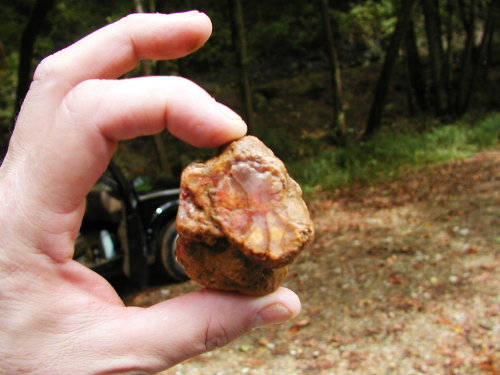They are as vibrant and varied as a new box of crayons, where the water washes and darkens them. Plain dusty old rocks brought to life by the waves. You can hear them skittering and rolling onto each other, a series of clicks and clacks, as they are tumbled by the ebb and flow of the water. I stop to finger one, wondering if it's an agate. It's hard to pick the really valuable ones out when they are all so pretty.
The key to testing whether it's a treasure or an ordinary rock? Let it dry.
In a sea of pastel dullness, you'll catch the tempered glint of the rough edges of an agate amongst all the basalt and granite. These rocks, which for so long belonged to the water, are polished smooth. The agates, harder than glass, formed in the heart of rocks from molten lava deep in the earth's crust, started life as a hollow place in a rock under fire. When the rock around the agate crumbles, this heart dances through the tumbling water until it is polished to a patina almost indescribable - like glass, but more opaque; like gemstones, but less sparkly; like an oil painting under good light.
So is life. Trials come, dry spells eclipse our strength. And when we are dry, dusty and tired, longing for the splash from some cool sea, you can see the ordinary and the extraordinary among us. Just as the agate slowly filled the heart of the stone, layer by beautiful layer, so the firestorms of our life lay up treasure inside of us that is only revealed when trials crush the outer self and what is at the heart is revealed.
A few of the "diamonds in the rough" whose troubled lives developed their character instead of destroying it:
Albert Einstein was once labeled "mentally handicapped", was kicked out of both primary school and denied entrance to university, was bullied and sneered at for his first 30 years of life.
Vincent van Gogh only sold a single painting in his life, yet starved himself to paint over 800 works now considered masterpieces. (I wonder where he stored them?) He suffered depression, infectious diseases, other mental illnesses, poverty, abuse, and was ridiculed and shunned in public.
Michael Jordan was cut from his high school basketball team. He often quantified his failures when asked to speak about his success. "I have missed more than 9,000 shots in my career. I have lost almost 300 games. On 26 occasions I have been entrusted to take the game winning shot, and I missed. I have failed over and over and over again in my life. And that is why I succeed."
Author Jack London sent the same story (his first) out over 600 times before it was accepted by a little-known, small circulation publisher. He went on to pen many top-selling novels and short stories and is considered one of American literature's giants.
In a massive research study exploring the childhoods of over 700 famous people throughout history, Victor and Mildred Goertzel discovered that a "hard knock life" may be a recipe for adult success:
Three-quarters of these successful people (525 of the 700) came from deeply troubled childhoods. They had endured extreme poverty, broken homes ... and even parental abuse. Over one-fourth (199 of the 700) had to deal with very serious physical handicaps such as deafness, blindness or crippled limbs. Over 80% of those who became successful writers and playwrights had watched their own parents struggle with intense psychological dramas. (quoted from http://www.boxingscene.com/motivation/10902.php)
Is your life rough right now? Have you ever thought about how trials reveal our true character? What is one character attribute that shines when you are under pressure, and what is one thing you'd like to change about you deal with stress?

No comments:
Post a Comment